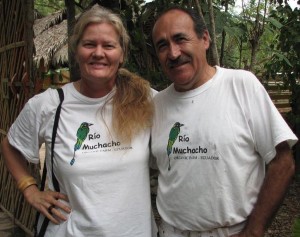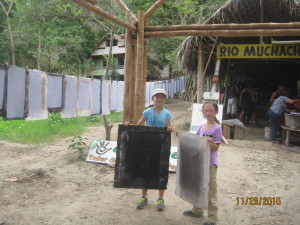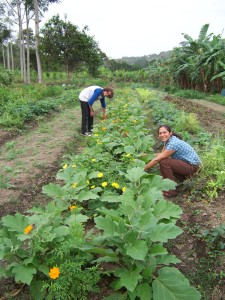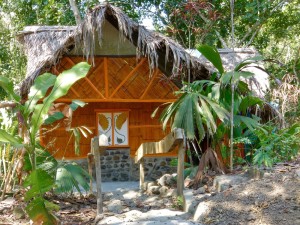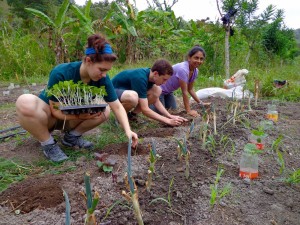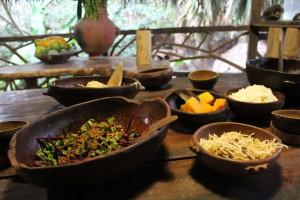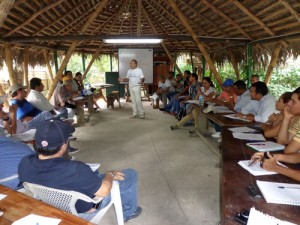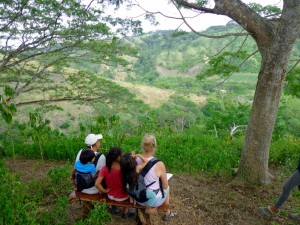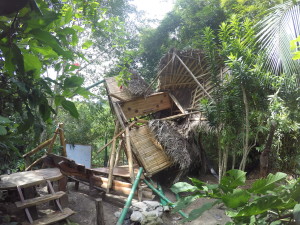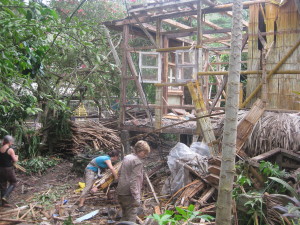Previous interviews:
- Masoala Forest Lodge, Madagascar
- Galapagos Eco Friendly Hotel, San Cristobal Island
- Lazy Dog Inn, Andes Mountains outside Huaraz, Peru
- Bonanza Lodge, Manu National Park, Peru
- Atlas Kasbah Ecolodge, Morocco
- Yacutinga Lodge, Argentina
Rio Muchacho Organic Farm and Eco-lodge
Editor’s note. On April 16, 2016, a 7.8 magnitude earthquake, with its epicenter in Ecuador, took the lives of over 650 people and did widespread damage to the country. Two additional earthquakes on May 18 registered magnitude 6.7 and 6.8. The Rio Muchacho Organic Farm and Eco-lodge was not spared. Although the lodge is back open and the area is recovering, a link at the bottom of the interview can be used to help with the rebuilding effort. The following interview took place with Nicola Mears in the fall of 2016.
—————————-
Nicola, I want to ask you about your lodge, the programs and activities that you offer, and the recovery operations since the April earthquake, but first I’d like to get some background on you and Dario. I see that you purchased the property in 1989. Before you tell us about the facility, can you let us know a bit about your background, as well as that of co-owner Darío Proaño-Leroux?
Dario is Ecuadorian, passionate about nature, and has a background in coastal resource management and tourism. I am from New Zealand. I grew up on a farm in the rural south island. There, I studied horticulture and sustainable agriculture. We met in 1989.
What was it that gave the two of you the confidence to undertake such an endeavor?
We were both passionate about agriculture, community, and creating a model of permaculture. We worked very intensely for 25 years on many different environmental projects (with no funding, only with the help of a couple of volunteers a year). One of these projects included paper recycling; we created the first paper-recycling project in Ecuador that lasted from 1992 until the earthquake in April this year. We also created the first organic shrimp farm in the world, an organic material recycling program in the city market place, an “eco-school” program that reached 11 schools, an environmental primary school, the organic farm, antilittering and cloth bag campaigns, and we also run a responsible eco-tour operator business. Many of these projects contributed to Bahia de Caraquez (our closest small city) being declared an eco-city by the local municipality.
Now let’s talk about the development of the facility itself. When you purchased the 9.5 hectares (23 acres), I believe it was already a farm. Was it also being used as an ecolodge at that time, or did that evolution occur after your purchase?
The farm was far from what it is today. There was heavy deforestation and soil degradation that occurred under previous ownership. First, we built a small family home and began the reforestation and organic farming. Naturally interest in what we were doing grew, and locals, Ecuadorians, and other tourist began to come to the farm wanting to learn about our practices. We slowly built more structures with local materials to accommodate the demand. From there, we welcomed more and more people and this allowed us to really expand the different projects on the farm and throughout the community.
I see that you offer a variety of accommodations, and can host up a number of visitors at one time. Can you give us a brief description of the current facilities?
Up until the earthquake, we were able to accommodate 55 people. We lost cabins that housed 25 beds, but we have been working hard to reconstruct them and we are almost back to 38 beds now. The cabins are creatively built with bamboo, stone, and wood. Each cabin featured many creative touches using bottles, wood, and other repurposed materials. The main feature of the constructions is the use of locally sourced bamboo and thatched roofs. There are rooms that sleep between 1-12 people. The farm also has an open kitchen and dining room. We also have quite a bit of productive landscaping including coffee, cassava, cacao, sugar cane, and more which surrounds the dining area. We have another open-air structure with our typical thatched roof that serves as our classroom, and contains a small library.
It seems that your lodge really focuses on educating both its visitors and the community at large. Why has this been such an important undertaking for you?
Education is very important for us and sustainable agriculture is too. We are only too aware of the need for change in food production methods. Here, we hold a strong belief that education is a core foundation to secure a better future. We have created a model here at our lodge, and offer numerous programs for visitors to learn alternatives and solutions to many of these food production and agricultural issues we face today. Throughout the years, we believe we have built an ideal place to learn and achieve a more sustainable society.
A lot of the education you offer is focused on the concepts of agroecology and permaculture. Can you give us a brief description of these concepts and why they play such an important role in your lodge?
Food is central to our lodge. We like to give people a farm-to-table experience, so it’s important for us to not only provide our own food but share the experience of picking, preparing, and eating. People also enjoy the cultural aspects of preparing food with our local cooks and enjoying it in our traditional utensils. Sustainable agriculture encompasses different methods, and here we practice a combination of agroecology and permaculture. Agroecology works to create an agricultural ecosystem where insect pests and diseases are kept in check by the natural balance of the ecosystem. Permaculture is a design system for sustainability. It includes integrating alternative energy, bio architecture, food crops, and animals.
I mentioned that you do a lot of work with the community. Can you describe some of activities that demonstrate your involvement?
The farm has coordinated a community environmental school for 23 years and has hosted thousands of community groups, farmers, teachers, and students. Unfortunately, the earthquake has halted or destroyed many of these initiatives. Despite this big setback, Río Muchacho continues to be a leader in change. Both in the community and at the farm, we are implementing new construction methods with bamboo. We recently led two bamboo construction workshops for workers around the community, bringing to light the beauty and strength of bamboo, as well as its incredible utility in creating resilient homes and structures. We trained some community members so that they can assist in the reconstruction of houses throughout the community. Since the earthquake, our priority has been to help rebuild the surrounding community, so our own reconstruction has been delayed a bit.
A lot of our readers will be curious as to the activities you offer to your visitors who come from outside the immediate area. Can you provide an overview of the types of things they may be interested in doing while staying at the lodge?
In addition to learning about agroecology and permaculture, and enjoying the adventures and cultural activities, there are lots more that guests can do by themselves, such as our two self guided walks, hiking, and enjoying the recreational spaces. Apart from that, we offer many organized activities including a fascinating three-day tour, a cultural exchange program, family tours, Spanish classes, and more.
I know you and your community suffered with the earthquakes this past spring. Can you describe some of the effects, how you are coping, and what readers can do to help?
The earthquake on April 16, registering 7.8 on the Richter scale, ravished Ecuador’s beautiful north coast. It was a very big shock to us as you can probably imagine! Canoa, a nearby city, suffered tremendous loss of life both during and following the earthquake. Infrastructure was devastated including the loss of 158 out of its 170 hotels. Although the town is beginning to recover and tourism slowly returns, complete reconstruction will take 6-10 years. We also had a lot of damage here at the Río Muchacho Organic Farm and in the surrounding community. Our Canoa office (and eco-paper workshop) was totally flattened. It was heart wrenching to lose 23 years’ worth of photos, materials from our many visitors, and documents that enable our farm to function smoothly. Here is a photo of our squashed office… well, you actually cannot see it because it is under this building!
While we are extremely grateful that none of the Rio Muchacho team or volunteers were in the office at the time of the earthquake, sadly seven of our neighbors were killed under this same building. On the farm, we lost 8 cabins/rooms, and 13 out of 16 of our main buildings still need reconstruction. Slowly but surely we are making progress. Since our priority has been to help rebuild the surrounding community, our own reconstruction has been delayed a bit. Only recently we finished dismantling the remnants of our main house. This was the center of activity, meetings, planning, and most of our life. Our new main house will be a single-floor relaxation space with hammocks and sofas, as well as our book exchange and library. We have also begun the process of transforming Río Muchacho into an organic-farm park in an effort to make the farm and surrounding nature more accessible to families. As part of the eco-farm park, we will build a vibrant information center and an interactive learning center for children. As always, we plan to use mostly natural materials that grow in the lowlands. Demand for these materials has grown immensely as more and more people become aware of their utility. Prices have risen, as well as the labor of those experts knowledgeable in working with bamboo. We give many thanks to the organizations who have helped by donating houses, including Firemen without Boarders, Hogar de Cristo, and MIDUVI.
As a final note…We Need Your Help! As you can probably imagine the price for necessary reconstruction at our organic farm remains daunting. In an effort to finish the rebuild as quickly as possible, we have set up a crowd funding campaign – we will be very grateful for any help you can give! Even a donation of $10 or $20 helps! Here is a link to the campaign: https://givealittle.co.nz/cause/riomuchacho.
We continue to work hard to create a beautiful learning space that is effective in spreading our mission to our local and international visitors, and to create a sustainable environment that is ecologically sound, economically viable, and that cherishes the intrinsic worth of every living thing.
Thank you again for your support. We hope you can visit us in the future!
Un abrazo para todos,
Nicola, Dario, Raphael, Florence, and The Río Muchacho Team.
For more information on the Rio Muchacho Organic Farm and Eco-lodge, please visit www.riomuchacho.com/




